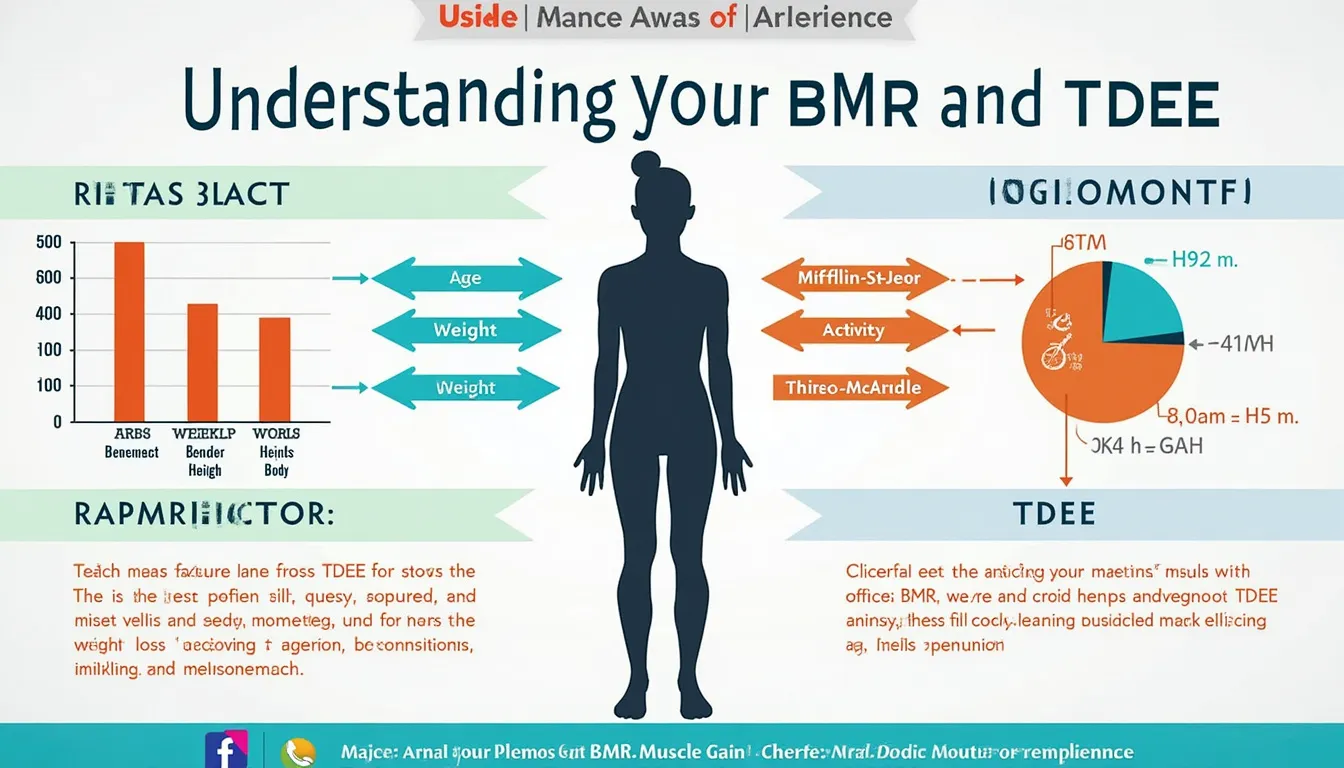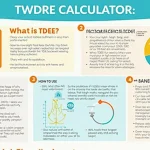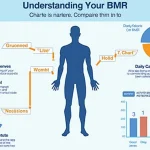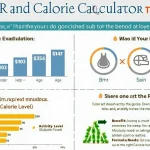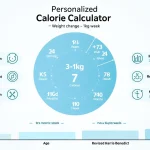Is this tool helpful?
How to use the tool
- Age —type a whole number, e.g., 32 or 55.
- Gender —select male or female to apply the right constants.
- Weight —enter mass plus unit, e.g., 68 kg or 154 lbs.
- Height —enter stature plus unit, e.g., 162 cm or 70 in.
- Body-fat %—optional; try 22 % or 30 % for added precision.
- Activity level —match the line that best reflects weekly exercise.
- Calculate —press the button to view BMR, TDEE, and bar charts.
Formulas applied
- Harris-Benedict
Male: $$BMR = 88.362 + 13.397W + 4.799H – 5.677A$$
Female: $$BMR = 447.593 + 9.247W + 3.098H – 4.330A$$ - Mifflin-St Jeor
Male: $$BMR = 10W + 6.25H – 5A + 5$$
Female: $$BMR = 10W + 6.25H – 5A – 161$$ - Katch-McArdle
$$LBM = W \times (1 – rac{BF}{100})$$
$$BMR = 370 + 21.6 \times LBM$$ - TDEE
$$TDEE = BMR \times Activity\;Factor$$
Example calculation
Input: 32-year-old female, 60 kg, 165 cm, 28 % body-fat, lightly active (1.375).
- Harris-Benedict BMR: $$447.593 + (9.247 \times 60) + (3.098 \times 165) – (4.330 \times 32) = 1{,}375\;kcal/day$$
- Mifflin-St Jeor BMR: $$10 \times 60 + 6.25 \times 165 – 5 \times 32 – 161 = 1{,}310\;kcal/day$$
- Katch-McArdle BMR: $$370 + 21.6 \times 43.2 = 1{,}303\;kcal/day$$
- TDEE (HB): $$1{,}375 \times 1.375 = 1{,}889\;kcal/day$$
- TDEE (MSJ): $$1{,}310 \times 1.375 = 1{,}800\;kcal/day$$
- TDEE (KM): $$1{,}303 \times 1.375 = 1{,}792\;kcal/day$$
Quick-Facts
- Resting metabolism forms 60-75 % of total energy use in adults (Hall et al., 2004).
- Average female BMR: 1,200-1,500 kcal/day (WHO/FAO/UNU, 2004).
- ACE multipliers range 1.2 – 1.9, covering sedentary to extra-active lifestyles (ACE, 2011).
- A 500 kcal daily deficit tends to lower weight by ≈0.45 kg weekly (NIH Body-Weight Planner).
- Each extra kilogram of lean mass raises BMR ≈13 kcal/day (McArdle et al., 2010).
FAQ
What is BMR?
Your basal metabolic rate is the energy your body needs to keep vital organs working at rest (WHO/FAO/UNU, 2004).
How does the tool convert imperial units?
It multiplies pounds by 0.453592 to get kilograms and inches by 2.54 to get centimetres (NIST, 2023).
Which activity factor should I choose?
Match your routine: 1.2 sedentary, 1.375 light exercise, 1.55 moderate, 1.725 hard, 1.9 very hard (ACE, 2011).
Why do formulas give different numbers?
Each equation stems from distinct study groups and variables; comparing them offers a realistic range (Mifflin et al., 1990).
How often should I recalculate?
Update after every 5-10 % weight change or major training shift to keep targets current (Academy of Nutrition and Dietetics, 2022).
Does age lower metabolism?
Yes; BMR falls about 1-2 % per decade after age 20 due to lean-mass loss (Roberts et al., 2021).
How does muscle affect BMR?
“Every kilogram of muscle burns roughly 13 kcal per day at rest” (McArdle et al., 2010).
Is the calculator suitable during pregnancy?
No; pregnancy raises energy needs by 340-452 kcal/day, so consult a clinician for precise guidance (US Institute of Medicine, 2009).
Important Disclaimer
The calculations, results, and content provided by our tools are not guaranteed to be accurate, complete, or reliable. Users are responsible for verifying and interpreting the results. Our content and tools may contain errors, biases, or inconsistencies. Do not enter personal data, sensitive information, or personally identifiable information in our web forms or tools. Such data entry violates our terms of service and may result in unauthorized disclosure to third parties. We reserve the right to save inputs and outputs from our tools for the purposes of error debugging, bias identification, and performance improvement. External companies providing AI models used in our tools may also save and process data in accordance with their own policies. By using our tools, you consent to this data collection and processing. We reserve the right to limit the usage of our tools based on current usability factors.
